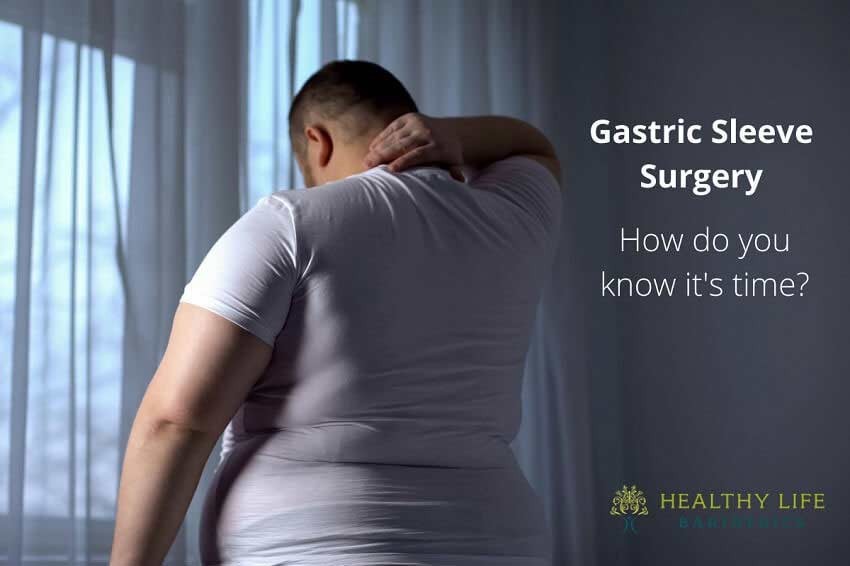
A big question people suffering from obesity want to know is: When is the best time to have gastric sleeve surgery?
Are you supposed to wait until you reach a certain number on the BMI scale? Is it necessary to suffer from one or more comorbidities? Or is there an insurance stipulation you should be looking for so that your health policy ends up picking up some or most of the tab?
These are all exceptionally good questions. Maybe you’ve asked some of these questions on your own behalf or for someone else you know who may be on the heavier side.
With regards to life-changing gastric sleeve surgery, it is true that bariatric surgeons have strict criteria that follow. You need to be a viable candidate for gastric sleeve if you hope for a surgeon to take your case.
And it’s also true that insurance companies have their own rules with regards to covering procedures like the sleeve gastrectomy, which is the gastric sleeve by another name.
Instead of playing guesswork, we’ve laid out all the rules you need to follow if you hope to enjoy the many benefits of gastric sleeve surgery. You can lose more than half of your excess weight or more, and that’s only the beginning. Keep reading to learn more about the gastric sleeve, how you can become a candidate, and how your quality of life can invariably improve by opting for this amazing procedure.
What is Gastric Sleeve Surgery & Is it Necessary for Weight Loss?

Gastric sleeve (also referred to as laparoscopic sleeve gastrectomy (LSG) and just simply sleeve gastrectomy) is a type of bariatric or weight loss surgery.
Weight loss surgery alters the shape and function of your digestive system. Surgeries like the gastric sleeve are reserved for those who are suffering from obesity to the extent where weight loss does not come easy.
Gastric sleeve is the most common weight loss procedure in the United States today.
The surgery helps individuals lose weight by restricting calories and altering hormonal responses in the body.
Around eighty percent of the stomach is removed. The removed portion of the stomach is the tissue that releases the hunger hormone ghrelin. Without that tissue, and the release of the hunger hormone, patients end up feeling less hungry overall.
The remaining stomach tissue is configured into a pouch-like sleeve. Food will pass into this sleeve on the way to digestion. Since the space reserved for your meals is limited, you end up eating less.
With less hunger and fewer calories consumed, weight loss is rapid, yet safe.
Gastric sleeve surgery is not the end-all-be-all to weight loss, however. All bariatric surgeries are merely components of an overall weight loss system.
To be successful with a treatment like the gastric sleeve, patients are expected to follow an overall treatment plan. This plan includes regular activities, nutritional guidelines, and mental health care.
If you can be willing to follow this treatment plan long-term, your weight loss goals are nearly
How Do You Know the Time is Right for Gastric Sleeve Surgery?
Being overweight is not enough to warrant treatment as drastic as gastric sleeve surgery.
While the gastric sleeve is performed on millions of patients each year, the surgery is considered a serious one, and there are risks.
Los Angeles, CA Bariatric surgeons and insurance providers also want to know that you are only turning to bariatric surgery, and the gastric sleeve specifically, after all other options failed.
A gastric sleeve should be a last resort, in other words, along your weight loss journey.
But we’re getting ahead of ourselves. You can know your time is right for gastric sleeve if you can satisfy these three criteria.
Criteria for Qualifying for Gastric Sleeve Surgery
High BMI

The body mass index scale (BMI) measures your body composition with regards to fatty tissue versus muscle, bone, organs, and connective tissue. A high BMI indicates a significant amount of fatty tissue.
To qualify for gastric sleeve surgery in Los Angeles, CA, bariatric surgeons recommend you wait until your BMI reaches as high as forty and above. A BMI that high indicates morbid obesity, which can be life-limiting.
One or More Comorbidities
There is an exception to the BMI rule. If you have a BMI as high as thirty-five AND one or more obesity comorbidities are present, you may in fact be qualified for gastric sleeve surgery.
Obesity comorbidities pose additional risks to your health. These ailments can include type 2 diabetes, heart disease, sleep apnea, and a host of others.
Previous Weight Loss Attempts
Before turning to gastric sleeve surgery, you should exhaust all avenues for healthy weight loss. Insurance providers are sticklers for ensuring bariatric surgery is the final remedy to a lifelong problem. Insurers may ask for receipts from gyms, proof of attendance in exercise classes and nutrition courses, just to use a couple of examples.
If you have done everything you can to try and lose weight, and yet the scale refuses to budge, you could be recommended for gastric sleeve surgery.
Lack of Addiction
A moment ago, we referred to the treatment plan associated with a procedure like the gastric sleeve. You may have been surprised to find mental health care as a component of any bariatric surgery plan.
Mental health care plays a vital component in the success of surgeries like gastric sleeve.
Emotional overeating, stress eating, are just two examples of ways poor mental health can sabotage your bariatric surgery results.
Addiction can also deter you from achieving greatness with the gastric sleeve. If you have a drug and/or alcohol addiction, be transparent with your bariatric surgeon. It is important to get those issues managed before opting for any bariatric procedure.
Alcohol, in particular, may affect you differently as a bariatric surgery patient. Individuals who have procedures like the gastric sleeve performed often report that it takes much less alcohol than before to affect their mental acuity and coordination. Drink too much and you might become sick or find yourself in a situation that is dangerous. Not to mention that alcohol is composed of empty calories that can reverse your weight loss progress.
Your bariatric surgeon can give you resources to help you overcome any addictions you may have before deciding to undergo sleeve gastrectomy surgery.
Do You Qualify? The Right Time for Gastric Sleeve Surgery is When You Feel Ready
By now you should have a better idea of your standing as far as qualifying for the gastric sleeve is concerned. If your BMI is forty or thirty-five with obesity comorbidities, and you have tried everything to lose weight to no avail, and you don’t have any mental health issues or addictions to speak of, now might be the best time to consider bariatric surgery.
What are the Risks of Gastric Sleeve Surgery?

You have a right to know about all the risks associated with a procedure as serious as gastric sleeve surgery. The risks associated with gastric sleeve surgery are considered low. You are less likely to pass from a gallbladder surgery or hip replacement surgery than you are from a bariatric procedure. In fact, fewer than one in twenty patients have a major complication when undergoing bariatric surgery.
And when you compare the risks associated with morbid obesity, there’s not even a question. Bariatric surgery risks are far lower by comparison!
What are the Benefits of Gastric Sleeve Surgery?
Now for the really good news. Gastric sleeve surgery can lead to significant weight loss.
The bulk of the excess weight will come off in the first few months, as the changes from the surgery take effect.
Some patients go on to lose up to 80 to 100 pounds in the first year following gastric sleeve surgery. The majority of bariatric patients maintain a loss of fifty or more percent of their excess body weight long-term.
In addition to weight loss, gastric sleeves and other bariatric procedures are considered effective treatments for obesity comorbidities.
You may have better management of type 2 diabetes, high blood pressure, and high cholesterol, and some are able to toss out their medications entirely as per their doctors’ recommendations.
Do You Qualify for Gastric Sleeve Surgery? How to Find Out
The best time for gastric sleeve surgery is when you’ve become morbidly obese. And you must be ready for a major life change.
If you have tried everything to lose weight and nothing has worked, book a consultation with a world-renowned bariatric surgeon, Dr. Babak Moeinolmolki, and finally gain control of your health and life.
To find out if you qualify for gastric sleeve, contact Healthy Life Bariatrics. Located in Los Angeles, California, we can help to improve your quality of life. Schedule your consultation today by calling 310-694-8448.


